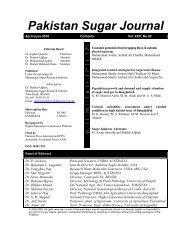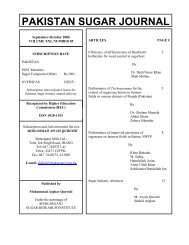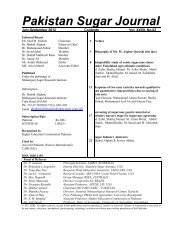Pakistan Sugar Journal - Shakarganj
Pakistan Sugar Journal - Shakarganj
Pakistan Sugar Journal - Shakarganj
You also want an ePaper? Increase the reach of your titles
YUMPU automatically turns print PDFs into web optimized ePapers that Google loves.
MORPHOLOGICAL & PHYSIOLOGICAL STUDY OF EXOTIC SUGARCANE CLONES AT<br />
ADVANCE NURSERY STAGE<br />
M. Zafar, Shafiq Ahmad, M. Azhar Munir, Abdul Ghaffar, Shahid Bashir, M. Walyat Ali and M. Afzal<br />
<strong>Sugar</strong>cane Research Institute, Faisalabad<br />
ABSTRACT<br />
To evaluate 110 clones against standard variety CP77-400 a non replicated double row trial was laid out<br />
having net plot size measuring 5X2.4m Keeping in view the desirable characters, 42 clones having desirable<br />
birx % growth and other quantitative characters were selected and were promoted to preliminary<br />
varietal trial while 68 clones were rejected due to undesirable characters, However 5.45%, 10.90%,<br />
9.09%, 3.63%, 8.18% 4.54% and 2.72 clones were rejected, due to poor growth, pithiness, low brix<br />
%age, aerial roots, cracks sprouts disease susceptibility, insect/pest infestation, hairiness lodging and<br />
short needed length respectively.<br />
Key words: Clone, standard variety, trial, nursery, desirable character, pithiness, brix.<br />
INTRODUCTION<br />
<strong>Sugar</strong>cane is an important cash crop of <strong>Pakistan</strong> (Ahmad et al., 1991, Rehman et al., 1992), which plays<br />
an important role in economic uplift of farmers, Moreover feeding of ever expanding sugar industry<br />
totally depends upon cane cultivation. However, the notional average cane yield is 53.2 tones/ha which is<br />
far below the potential of existing cane varieties (Ann. 2007). The yield can be enhanced by adopting the<br />
improved package of technology and by growing high yielding varieties (Heinz 1987). However development<br />
of new sugarcane varieties is not feasible in <strong>Pakistan</strong> because of intricate flowering of the plant and<br />
non availability of sugarcane breeding facilities and acclimatization (Javed et al., 2001). Thus selection in<br />
general, forms the base line for the cane agronomist in <strong>Pakistan</strong> to develop new varieties. The variety improvement<br />
in sugarcane is equally important from the breeders and growers point of view. Potential of<br />
new genotypes needs to be tested in local environment over various locations for different years before<br />
deciding to release as new cultivar in a particular region (Basfor and Cooper 1998, Pollock 1975 Ruschell<br />
1977, Tai et al., 1982, Kanf and Millers 1984, Milligan et al., 1990, Khan 1981 and Khan et al., 2000).<br />
The clonel selection at the pre commercial stages helps in identification of improved genotypes for commercial<br />
production of sugarcane (Claz et al., 2000). All the stages in varietal selection programme are important<br />
but establishment of a good nursery is of prime importance, because evolution of durable and dependable<br />
variety can be expected if it expands from a good nursery. Keeping in view the importance of<br />
the nursery, present study was conducted under agro-climatic conditions of Faisalabad.<br />
MATERIALS AND METHODS<br />
In advance nursery 110 clones having 14 parent crosses of exotic origin received from primary Nursery<br />
stage were tested in a non-replicated double row trial (Augmented design) having net plot size 5X2.4m<br />
during 2008. These clones were compared with standard variety CP77-400. Keeping in view the desirable<br />
characters such as growth vigor, frost resistance, erectness, resistance to lodging, hairiness cracks,<br />
aerial roots, tillering, sprouts, disease susceptibility and insect pest infestation, damage by sun burn and<br />
brix% age etc. The brix reading was recorded by hand refractometer. After comparing the quantitative<br />
and qualitative characters of all clones with standard variety CP77-400, 42 clones (38.19%) were promoted<br />
to preliminary varietal trials while, 68 clones (61.81%) were rejected due to undesirable characters.<br />
The selection was made by the committee of experts in the field.<br />
<strong>Pakistan</strong> <strong>Sugar</strong> <strong>Journal</strong> April-June 2012 16






